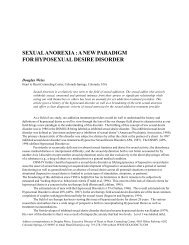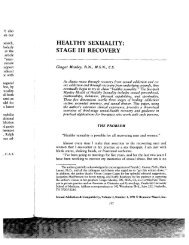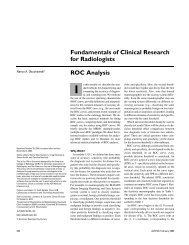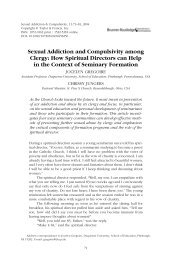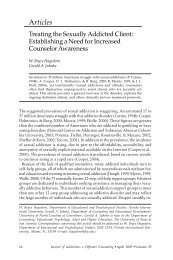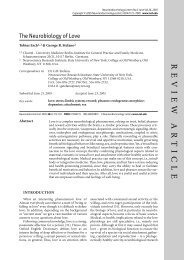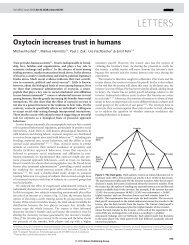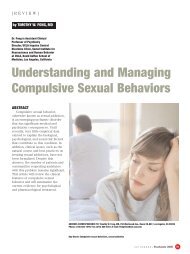An Overview of Psychiatric Ethics
An Overview of Psychiatric Ethics
An Overview of Psychiatric Ethics
Create successful ePaper yourself
Turn your PDF publications into a flip-book with our unique Google optimized e-Paper software.
Normative Ethical Theories and Psychiatry1evolution <strong>of</strong> Western societies into consumer economies, 12 the commercialization <strong>of</strong> the healthsystem and the technological advances in medicine. 7, 12 It has been argued that, in the light <strong>of</strong> suchdevelopments, the craft <strong>of</strong> medicine has evolved into a service industry in which technical skills aretraded in a market place. As such, the notions <strong>of</strong> a physician’s virtue and the Hippocratic traditionhave been lost. The scale <strong>of</strong> the practice <strong>of</strong> medicine has also increased exponentially. In developedcountries medicine has changed in one or two generations from a cottage industry toone consuming a significant portion <strong>of</strong> each country’s gross domestic product. 12Pr<strong>of</strong>essional ethics, arguably, have three core components – specialized training and the acquisition<strong>of</strong> specialized skills; the provision <strong>of</strong> expert assistance to those who are vulnerable and in need; andthe virtues <strong>of</strong> trustworthiness, efficacy and knowledge which ultimately enhance the common goodand aggregate well being. 13Several physicians’ organizations have jointly outlined a series <strong>of</strong> principles and responsibilities forthe medical pr<strong>of</strong>ession, which integrate the recent influences on medical practice 14 . In this newcode, the principles <strong>of</strong> patient welfare, patient autonomy and social justice are juxtaposed with theresponsibilities <strong>of</strong> commitment to pr<strong>of</strong>essional competence, honesty with patients, confidentiality,appropriate relations, improving quality <strong>of</strong> care, improving access to care, ensuring a fair distribution<strong>of</strong> finite resources, pursuit <strong>of</strong> scientific knowledge and maintenance <strong>of</strong> trust by managing conflicts <strong>of</strong>interest and pr<strong>of</strong>essional responsibilities.<strong>An</strong>y medical practitioner abides by a social contract 14 as both a healer and pr<strong>of</strong>essional. Pr<strong>of</strong>essionalethical autonomy is therefore given on the understanding that pr<strong>of</strong>essionals will devote themselvesto serving the best interests <strong>of</strong> society and will self-regulate to maintain high quality service. 1507Social Contract TheoriesHumans tend to act primarily out <strong>of</strong> self-interest. Whilst there may be many instances where peopletake action out <strong>of</strong> altruism, the strongest motivation to act for a person is out <strong>of</strong> self-regard.The English philosopher Hobbes postulated that humans were, by nature, prone to act in selfinterest.16 In Hobbes’ view, society would deteriorate to a violent state <strong>of</strong> anarchy unless regulatedby laws. Hobbes argued that everyone was vulnerable in such a “state <strong>of</strong> nature”, even the mostcanny or physically capable. In the alternate, humans could agree to abide by a covenant in whichthey would all act in a way that allowed others to go about their lives without fear <strong>of</strong> being attackedor exploited. In essence, all members <strong>of</strong> society would act out <strong>of</strong> their own self-interest to participatein an agreement in which a set <strong>of</strong> laws would create a society where no-one was allowed to actin an exploitative or violent manner. The self-interest component <strong>of</strong> such an arrangement was thateach participant would recognize that it was in their interest to have a society where they couldpursue their life’s goals in safety and harmony. The one potential pitfall in this arrangement would bethe so-called “moral free rider”, who would still act in an unconstrained manner out <strong>of</strong> self-interest,yet expect the benefits <strong>of</strong> the social contract. Hobbes’ solution to this was a powerful sovereign(or “Leviathan”), who would enforce the social contract arrangement by punishing or excludingthose persons who violated the social contract arrangement. Later social contract theorists such asGauthier have described less dramatic instances <strong>of</strong> social contract, such as the so-called “prisonersdilemma” thought experiment, in which two prisoners see a mutual advantage in not informing oneach other and therefore act out <strong>of</strong> mutual self-interest.Social contract theories have been criticized as historically inaccurate (“not worth the paper theywere never written on”), 17 as well as their implicit moral nihilism – they effectively assume the worst<strong>of</strong> humans and assert that as a species we are incapable <strong>of</strong> any form <strong>of</strong> moral responsibility.Applied to a pr<strong>of</strong>essional context, the contractarian approach to ethics involves the assumptionthat a pr<strong>of</strong>essional group will, primarily out <strong>of</strong> self-interest, abide by an agreed set <strong>of</strong> expectations<strong>of</strong> behaviour and conduct. This is usually in exchange for a level <strong>of</strong> pr<strong>of</strong>essional autonomy orself-regulation. When a pr<strong>of</strong>ession is seen to fail in this agreement, in either a specific instance oran overall manner, society tends to respond through enacting legislation to enforce a particularchange. For example, if there are a number <strong>of</strong> instances <strong>of</strong> failure <strong>of</strong> a pr<strong>of</strong>essional group to maintainstandards <strong>of</strong> practice, then a society’s legislators will enact laws to force the pr<strong>of</strong>ession to introducesuch standards. In essence, the penalty for a pr<strong>of</strong>ession’s failing to meet the expectations <strong>of</strong> thesocial contract is the loss <strong>of</strong> various components <strong>of</strong> self-regulation.IMET AN OVERVIEW OF PSYCHIATRIC ETHICS



